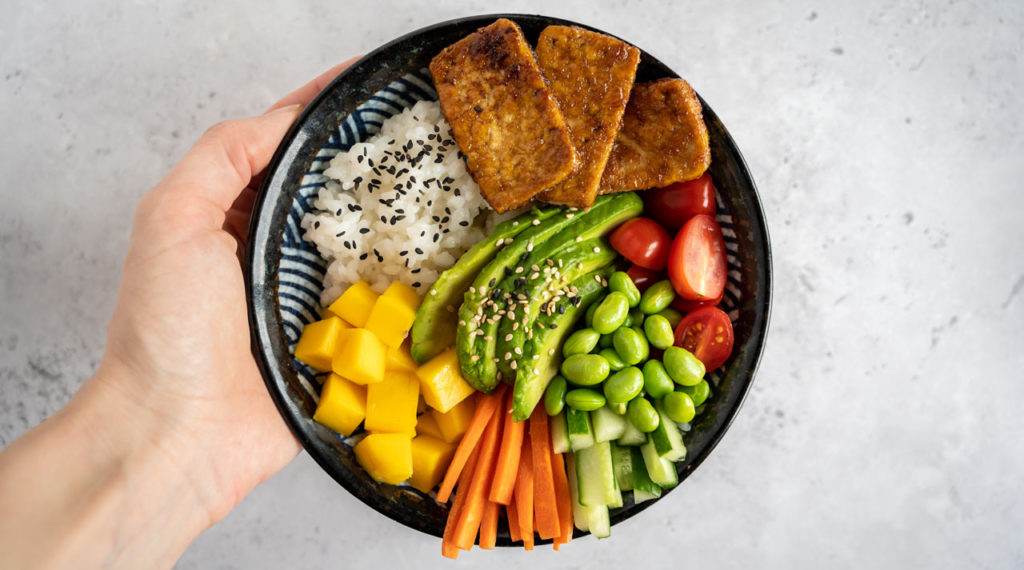Federated Health Charities’ mission is to improve the health and quality of life of all Ontarians by supporting 21 different health charities providing critical services to those experiencing, or affected by, illness. We believe education and prevention are key parts of supporting the health of our communities so our weekly Health Hint series strives to provide tangible and easy to implement hints and tips on how to maintain your health, prevent disease, and enjoy increased quality of life. Check out our latest Health Hint on the benefits and considerations of a vegan diet. We hope you find it helpful. If you would like to join our efforts to support the health of Ontario please consider a donation to Federated Health Charities.
Veganism has exploded in popularity in recent years. A vegan diet is becoming increasingly popular for ethical, environmental, and health reasons. When done correctly, some say such a diet can lead to weight loss and better blood sugar management, among other health benefits. However, a diet consisting solely of plant foods may raise the risk of nutritional shortages in some people. This article provides a comprehensive introduction to the vegan diet for beginners. As with all our articles, it is intended for informational purposes only. If you are going to embark on a major dietary intake change, we recommend you consult with your health care provider first to ensure it is right for you.
What is a Vegan Diet?
A vegan diet consists only of plant-based meals. All animal products, including meat, dairy, and eggs, those who follow this diet use to avoid them. Veganism is a nutritional choice for some, but it is also a lifestyle decision for others. Vegans who embrace it as a lifestyle avoid wearing garments, soaps, and other goods that utilise or include animal components, such as leather and animal hair. Some people choose this lifestyle & diet because of its sustainability and environmental benefits.
Fruits, vegetables, legumes, nuts, and seeds are naturally grown, whole foods and are commonly found in vegan diets. A wide range of vital vitamins, minerals, and healthy fats may be obtained by eating a variety of these foods. People who follow this diet, however, should make sure they obtain critical nutrients that they normally get from animal products. Iron, protein, calcium, vitamin B-12, and vitamin D are among these nutrients. (Petre, 2021) (Zelman, 2021)
Types of Vegan Diets
Although the term vegan is commonly used as a general term, vegan diets actually come in a variety of styles. Among the most frequent are:
- Whole food: A vegan diet centred on a broad range of whole plant foods such as fruits, vegetables, whole grains, legumes, nuts, and seeds is known as a whole-food vegan diet.
- Raw food: A vegan diet focused on raw fruits, vegetables, nuts, seeds, or plant foods cooked at temperatures below 118°F (48°C) is known as a raw-food vegan diet (1Trusted Source).
- 80/10/10: The 80/10/10 diet is a raw-food vegan diet that avoids high-fat foods like nuts and avocados and instead focuses on raw fruits and soft greens. Also known as the fruitarian diet or the low-fat, raw-food vegan diet.
- The starch solution: A low-fat, high-carb vegan diet similar to the 80/10/10, but focusing on cooked starches such as potatoes, rice, and maize rather than fruit.
- Raw till 4 p.m.: The 80/10/10 and starch solution inspired this low-fat vegan diet. Raw foods are eaten until 4 p.m., with a cooked plant-based meal as an alternative for supper.
- Thrive diet: The thrive diet is a vegan raw food diet. Plant-based, entire foods are consumed raw or prepared at moderate temperatures by followers.
Tips to Eating a Nutrition Packed Vegan Diet
In recent years, vegetarianism and veganism has become increasingly accepted and accessible. There is no denying that eating more vegetables, fruits and other foods rich in fiber has great health benefits. But eating a vegan diet full of processed, nutritionally void foods can put one at risk for serious nutritional deficiencies and complications. As with any dietary change, it is critical to ensure you are still getting a well-rounded intake of macro and micronutrients. Here are some tips on how to eat vegan in a healthy and nutritious way.

Increase your whole grain intake
To compensate for some of the nutritional deficiencies associated with cutting out animal-based foods, vegans should diversify their diets. Grains are a key part of the diet for vegetarians and vegans. Vegans should enjoy staple foods such as rice, quinoa, and pasta, with no less than 100 grams per meal. There are a wide variety of nutritionally dense grains to provide a variety of tastes, texture, and nutrients.
Eat soy reasonably
Soy is rich in high-quality protein, unsaturated fatty acids and vitamins, as well as a variety of other healthy substances. It is an important food for vegans and should be a part of daily intake. Soybean products are diverse, such as soybean milk, tofu, dried beans, soybean sprouts and so on. Additionally, fermented soybean products, such as fermented bean curd, fermented black beans, broad-bean sauce and soy sauce, are made from soybean as raw material and fermented by microorganisms.
That being said, there is some research that shows that digesting soy can be difficult for some depending on how it is processed. The digestibility of soybean protein was significantly affected by different processing and cooking methods. For example, the protein digestibility of whole cooked soybeans is only about 65%, but after processing into soymilk or tofu, the digestibility can be increased to more than 80%. So be mindful of the types of soy you are consuming and the quantities of the different forms.
Eat nuts, mushrooms and other dense sources of vitamins
Nuts are rich in protein, unsaturated fatty acids, vitamins and minerals, and eating nuts regularly is good for heart health. Nuts are not only a good source of protein for vegans, but also a good source of unsaturated fatty acids, vitamins and minerals.
Seaweed is rich in minerals and can be used as a source of N-3 polyunsaturated fatty acids for vegan people.
Mushrooms are rich in minerals, fungi and carbohydrates, as well as plant compounds beneficial to human health, and can be an important source of vitamins and minerals.
Fresh vegetables and fruits are especially important for vegans. They are rich in various nutrients and people should eat them in ample supply.
Choose proper cooking oils
Various oils should be consumed to meet the needs of essential fatty acids. The human body’s needs for fatty acids are diverse, so it is recommended that people frequently consume different kinds of cooking oils to get a variety of fats. Different cooking oils have different contents of unsaturated fatty acids, and vegans tend to lack N-3 polyunsaturated fatty acids. It is recommended to choose edible oils containing N-3 polyunsaturated fatty acids, such as Perilla oil, flaxseed oil, rapeseed oil, soybean oil, etc.
We hope this article has provided a general overview for you on a vegan diet. We encourage you to do further research and consult with your health care provider should you want to embark on a vegan diet.
We hope you enjoyed out latest Health Hint!
Written by An Lin Chen
Related Articles
Health Hint! – 5 diets that could support your health
Health Hint! – Basics of Calories & Nutrients
Health Hint: What are Nutrients?
References:
Petre, A. (2016, November 1). The vegan diet – a complete guide for Beginners. Healthline. Retrieved October 9, 2021, from https://www.healthline.com/nutrition/vegan-diet-guide.
Zelman, K. M. (2021, September 6). Vegan diet – foods you can and cannot eat, benefits and risks. WebMD. Retrieved October 9, 2021, from https://www.webmd.com/diet/vegan-diet-overview#1.
Petre, A. (2016, November 1). The vegan diet – a complete guide for Beginners. Healthline. Retrieved October 9, 2021, from https://www.healthline.com/nutrition/vegan-diet-guide.
Zelman, K. M. (2021, September 6). Vegan diet – foods you can and cannot eat, benefits and risks. WebMD. Retrieved October 9, 2021, from https://www.webmd.com/diet/vegan-diet-overview#1.
MediLexicon International. (n.d.). Vegan diet: Health benefits, foods, and tips. Medical News Today. Retrieved October 9, 2021, from https://www.medicalnewstoday.com/articles/149636#_noHeaderPrefixedContent.
Mayo Foundation for Medical Education and Research. (2020, August 20). Vegetarian diet: How to get the best nutrition. Mayo Clinic. Retrieved October 9, 2021, from https://www.mayoclinic.org/healthy-lifestyle/nutrition-and-healthy-eating/in-depth/vegetarian-diet/art-20046446.
Petre, A. (2016, November 1). The vegan diet – a complete guide for Beginners. Healthline. Retrieved October 9, 2021, from https://www.healthline.com/nutrition/vegan-diet-guide.
Zelman, K. M. (2021, September 6). Vegan diet – foods you can and cannot eat, benefits and risks. WebMD. Retrieved October 9, 2021, from https://www.webmd.com/diet/vegan-diet-overview#1.
MediLexicon International. (n.d.): Health benefits, foods, and tips. Medical News Today. Retrieved October 9, 2021, from https://www.medicalnewstoday.com/articles/149636#_noHeaderPrefixedContent.
Mayo Foundation for Medical Education and Research. (2020, August 20). Vegetarian diet: How to get the best nutrition. Mayo Clinic. Retrieved October 9, 2021, from https://www.mayoclinic.org/healthy-lifestyle/nutrition-and-healthy-eating/in-depth/vegetarian-diet/art-20046446.






